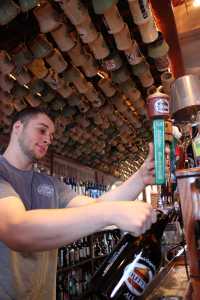AUGUSTA — For that sinking feeling when the local brewery’s growler – the half-gallon glass container so integral to your weekend camping with your buddies – is rejected; beer-lovers, a lawmaker has your back.
Rep. Jeff McCabe, D-Skowhegan, is proposing amending a state law to remove a requirement that breweries selling growlers provide their own uniquely-labeled containers.
LD 1083, “An Act To Facilitate the Use of Half-gallon Containers for Malt Liquor at Maine Brew Pubs,” would enable participating breweries — the law wouldn’t be mandatory — to fill any 32- or 64-ounce container a patron brings in, even if it comes from another establishment.
McCabe said he heard from constituents frustrated they had to purchase individual growlers from every brewery. Customers are charged a deposit for new growlers, usually between $5 to $10, plus the cost of beer. Though not all of the state’s 61 breweries sell growlers, for an ardent beer-lover, the costs can add up.
Another advantage is portability. McCabe, an outdoor enthusiast, said stainless steel options aren’t as fragile as glass making them ideal for camping trips.
“It’s a matter of consumer choice. Beer spans across the political spectrum,” McCabe said.
Oak Pond brews nearly 16,000 gallons of beer every year, much of it sold in the clear, half-gallon growlers stamped with the brewery’s name and logo. Without those portable advertisements going out the door, Oak Pond loses brand recognition, he said.
Worse, if beer were to be poured from a different growler and the quality was compromised by an unclean glass, his reputation could be hurt.
“It’s a slippery slope,” Chandler said.
The bill has not yet addressed how the rule change would comply with federal regulations that require, among other labeling, a surgeon general’s warning. McCabe suggested a paper sticker with the warning could be printed at the point of sale, or hanging a paper tag to put on the outside.
In 2013, similar legislation failed to make its way out of committee chamber in the face of industry opposition. A competing bill, LD 510, “An Act To Increase the Number of Container Options for Breweries,” was not recommended by the committee.
Still McCabe, while acknowledging brewers have legitimate concerns, said the bill isn’t intended to hinder the industry, but promote it.
In Vermont and New York, beer-filling laws are looser, and brewers seem to have adapted, he said. The solutions are potentially simple: Breweries could clean the containers, as they would their own, or deny sale of a dirty container.
“Breweries should have the right to say, ‘Hit the road if you’re not bringing in a clean growler,'” he said.
Due to a reporting error this story originally gave the incorrect number of licensed breweries in the state. There are currently 61.


Comments are no longer available on this story